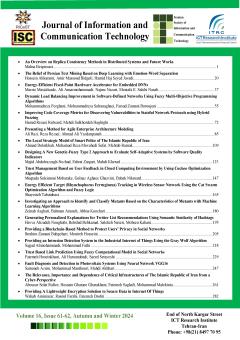Trust Management Based on User Feedback in Cloud Computing Environment by Using Cuckoo Optimization Algorithm
Subject Areas : فناوری اطلاعات و ارتباطاتMuqtada Soleimani Mobarake 1 , Golnaz Aghaee 2 , Babak Nikmard 3
1 - Masters student, Computer Engineering, Department of Computer Engineering, Islamic Azad University, Dolatabad Branch, Isfahan, Iran
2 - Department of Computer ,Dolat abad Branch, Islamic Azad University, isfahan, Iran
3 - Department of Computer ,Dolat abad Branch, Islamic Azad University, isfahan, Iran
Keywords: cloud computing, trust management, user feedback, cuckoo optimization algorithm, K-Means algorithm,
Abstract :
Cloud computing provides computational services such as servers, memory, storage space, databases, networks, software, analytics, and information as virtualized resources through the internet to offer faster innovation, flexible resources, and cost savings at scale. Although cloud computing service providers are innovatively expanding their services, trust is one of the major obstacles to the progress of this matter. Trust is the biggest issue in cloud computing since trust is an effective guarantor during interactions between the users and the providers. Trust is one of the most fundamental methods for increasing confidence in resources provided in the cloud environment and is important in cloud business environments. With the increasing number of cloud services providers in the cloud computing environment and the number of users, the selection of provider has become a major challenge. The Coa algorithm has a higher convergence speed, at least by 5.9%, compared to the studied algorithms. In this research, an optimization approach based on a metaheuristic process using the COA algorithm combined with the K-means clustering algorithm is proposed to solve the optimization problem of selecting the best provider in the trust management third-party component layer based on parameters. In this method, while reducing trust evaluation time, the accuracy of user access to the most trusted provider based on user priorities has increased compared to previous methods. This can increase user confidence and improve the quality of service providers.
[1] Jens Lansing , Ali Sunyaev, “Trust in CloudComputing: Conceptual Typology and Trust- BuildingAntecedents”, ACM SIGMIS Database SystemsVolume 47Issue 2May 2016,pp 58–96
[2] Huang, J., Nicol, D.M, “Trust mechanisms for cloud computing”, Journal of Cloud Computing Advances, Systems and Applications volume 2, Article number: 9 (2013) , pp 1-14.
[3] F. Azzedin and M. Maheswaran, "Towards Trust-Aware Resource Management in Grid Computing Systems," 2nd IEEE/ACM International Symposium on Cluster Computing and the Grid CCGRID'02), Berlin, Germany, 2002, pp. 452-452.
[4] Abhishek Kesarwani, Pabitra Mohan Khilar, " Development of trustbased access control models using fuzzy logic in cloud computing " Journal of King Saud University - Computer and Information Sciences, Volume 34, Issue 5, 2022, pp1958-1967.
[5] P. Gupta, M. K. Goyal and P. Kumar, "Trust and reliabilitybased load balancing algorithm for cloud . IaaS," 2013 3rd IEEE International Advance Computing Conference (IACC), Ghaziabad, India, 2013, pp. 65-69.
[6] Mohammad Javad Salehi1, Mehrdad Ashtiani2* and Behrouz Minaei Bidgoli Cloud Service Selection based on the Credibility persistency of Users’Feedbacks, Volume 7, Issue 1 December 2018Pages 29-41.
[7] Tabassum N. Mujawar, Lokesh B. Bhajantri, “Behavior and feedbackbased trust computation in cloud environment”, Journal of King Saud University - Computer and Information Sciences, Volume 34, Issue 8, PartA,2022, Pages 4956-4967.
[8] Aghaee Ghazvini, G., Mohsenzadeh, M., Nasiri, R. et al. " A new multi-level trust management framework (MLTM) for solving the invalidity and sparse problems of user feedback ratings in cloud environments”. J Supercomput 77, (2021), pp2326–2354 (2021).
[9] H. Hassan, A. I. El-Desouky, A. Ibrahim, E. -S. M. El-Kenawy and R. Arnous, "Enhanced QoS-Based Model for Trust Assessment in Cloud Computing Environment," in IEEE Access, 2020, vol. 8, pp. 43752-43763.
[10] Aghaee Ghazvini, G, Mohsenzadeh, M, Nasiri, R, Masoud Rahmani, A. MMLT: A mutual multilevel trust framework based on trusted third parties in multicloud environments. Software Pract .Exper. 2020; 50: 1203– 1227, pp 1-25.
[11] Noor, T.H., Sheng, Q.Z. (2011). “Trust as a Service: A Framework for Trust Management in Cloud Environments” In: Bouguettaya, A., Hauswirth, M., Liu, L. (eds) Web Information System Engineering – WISE 2011. WISE 2011. Lecture Notes in Computer Science, vol 6997. Springer, Berlin, Heidelberg.pp315-317.
[12] Shakeel Ahmad, Bashir Ahmad, Sheikh Muhammad Saqib and Rashid Muhammad Khattak, “Trust Model : Cloud’s Provider and Cloud’s User”,International Journal of Advanced Science and Technology Vol.44,July,2012.
[13] Saurabh Kumar Garg, Steve Versteeg, Rajkumar Buyya, A framework for ranking of cloud computing services, Future Generation Computer Systems, Volume 29, Issue 4,2013, Pages 1012-1023,
[14] Muhammad Kashif Naseer, Sohail Jabbar, Dr. Irfan Zafar, “ ANovel Trust Model for Selection of . Cloud Service Provider”, (IEEE 2014) ,2014.
[15] Paul Manuel, 2015. "A trust model of cloud computing based on Quality of Service," Annals of . Operations Research, Springer, vol. 233(1), pages 281-292, October.
[16] Talal H. Noor, Quan Z. Sheng, Athman Bouguettaya ,Trust Management in Cloud Services, Springer, 2014,pp1-119.
[17] Ricardo Perez-Truglia, Markets, trust and cultural biases: evidence from eBay, Journal of Behavioral and Experimental Economics, Volume 72,2018, pp 17-27.
[18] Rajabioun, Ramin. (2011). Cuckoo Optimization Algorithm. Applied Soft Computing. 11. pp5508–5518.
[19] J. Gibson, R. Rondeau, D. Eveleigh and Q. Tan, "Benefits and challenges of three cloud computing service models," 2012 Fourth International Conference on Computational Aspects of Social Networks (CASoN), Sao Carlos, Brazil, 2012, pp. 198-205
. [20] Sana, Kouchi & Nacer, Hassina. (2022). Service Selection in Cloud Computing Environment by Using Cuckoo Search. 10.1007/978-3-030-91738-8_2 pp219-227.


